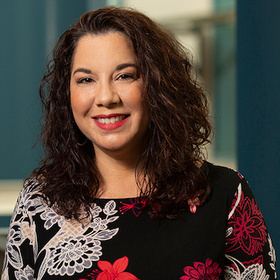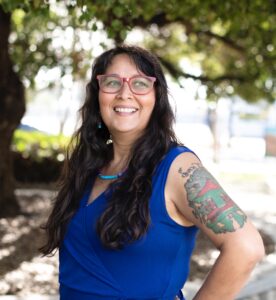Colleen Robledo Greene, MLIS, is an academic librarian, college educator, and digital historian who has been researching her family history since 1997. She is the Digital Scholarship Librarian at California State University, Fullerton, and she is part of the leadership team for CSUF DEFCon. Colleen has taught an online graduate-level genealogical research methods course since […]
This spring, join CSUF Digital for two hands-on Workshop Series that delve into the use of digital tools and platforms to centers ethnic voices and transformative learning. Participants can choose from two in-depth series, either focusing on Latinx Digital Humanities or Digital Collections, Archives, and Exhibits. Each series concludes with a certificate, and participants will receive hands-on practice building story maps, virtual timelines, and assembling digital collections.
What would you like to learn?

Latinx Digital Humanities
- Sat. April 13th • 9-11:30am PST
- Sat. April 20th • 9-11:30am PST
- Sat. April 27th • 9-11:30am PST
This multi-session workshop series is led by Prof. Sarah Rafael Garcia (DEFCon Fellow, CSUF Latinx Lab, and Founder, LibroMobile). Throughout this workshop Sarah will introduce participants to the basics of digital humanities (DH) ethics and the use of open-access applications for creating virtual timelines and story maps. The workshop will also cover effective digital storytelling techniques for BIPOC communities.
Beyond the basic definition of digital humanities, this workshop advocates for equitable digital practices. Participants will explore who should tell the story and how to properly cite and credit work produced by BIPOC communities, both within and outside of academia. They will also explore platforms and topics created by other scholars of color, and their purposes. This workshop series aims to foster deep discussion, reflection, collaboration, and questioning.
- Session 1: Definitions: DH, Virtual Timelines, Digital StoryMaps
- Session 2: Virtual Timelines & Digital Storytelling
- Session 3: Mapping Latinx Communities y Más
- (optional): Closing Circle & Individual Meetings
To ensure the quality of engagement, registration is limited to 12 people.
Prerequisites: No prior experience/familiarity with digital tools or platforms is needed. Participants are expected to use a laptop or compatible device with access to Google Drive apps. This workshop is open to faculty, students (graduate and undergraduate), staff, and interested community members.
Workshop Format: HYBRID. Participants may attend this series in-person on the CSUF Campus or online via zoom. All workshop sessions will be live and synchronous.

Digital Collections, Archives, and Exhibits Series
- Fri. April 12th • Asynchronous Module
- Fri. April 19th • 10am-12:30pm PST
- Fri. April 26th • 10am-12:30pm PST
- Fri. May 3rd • 11am-12:30pm PST
Digital humanists often utilize digital collections and archives in their research. Digital humanists also often create or curate digital collections, archives, and exhibits. We sometimes use these terms interchangeably, yet there are distinctions between these three concepts.
We need to understand the important relationships between these three concepts as we grow our fluency in the vocabulary of digital humanities, collaborate with other digital humanists, and make decisions about platforms and digital projects.
This four-part workshop series includes:
- explaining these concepts and exploring examples; followed by a deep-dive on two platforms that help to curate & share digital collections, archives, and exhibits.
- Hands-on workshop on one of the most popular platforms: Omeka (Classic version)
- Hands-on workshop on a more recent platform: Collection Builder SHEETS.
- Panel presentation & discussion with experts from the Pollak Library about the resources and opportunities available at CSUF and in the CSU system to help digital scholars share and preserve their work.
Prerequisites: No prior experience/familiarity with digital tools or platforms is required. Participants should have access to a computer and a secure internet connection. This workshop is open to faculty, students (graduate and undergraduate), staff, and interested community members.
Workshop Format: FULLY VIRTUAL/ONLINE. There is one asynchronous module you will watch on your own. The remaining three sessions will be live synchronous Zoom sessions.
FAQ
Can I receive the certificate if I only attend some of the workshop series?
- No. In order to receive the certificate, participants must attend all workshop sessions and complete workshop activities.
How long is the entire workshop series in hours?
- The Latinx DH workshop series includes about 7.5 hours of required components. The Digital Collections, Archives and Exhibits workshop includes 9 hours of required components, plus optional additional learning opportunities.
What are the final deliverables required for this workshop series?
- No final deliverables from you are required, though we do encourage participants to try everything at least once to gain greater hands-on practice with the digital tools and platforms.
When will I receive my certificate after the workshop?
- Certificates will be issued within 2 weeks of completion of the workshop series.
Can I participate remotely in the workshop series?
- Yes, remote or virtual participation is available for both workshops.
If I’m not pursuing the certificate, can I still attend select workshop sessions?
- Yes, but you need to be fully registered and make your intentions known to the workshop facilitator directly.
Facilitators
Sarah Rafael García, M.F.A.
Sarah Rafael García is an award-winning Chicana author and multimedia literary arts advocate in Santa Ana. Her book, SanTana’s Fairy Tales, is part of an oral history multimedia exhibition awarded by the Andy Warhol Foundation and an Ethnic Studies text in Santa Ana Unified School District. García’s DH work began as a 2020 USLDH-Mellon Grantee with […]
Let’s stay in touch:
Keep up with our different projects on Instagram and the web. And reach out to connect about other digital humanities projects!
d.h@fullerton.edu or jmoorepewu@fullerton.edu

